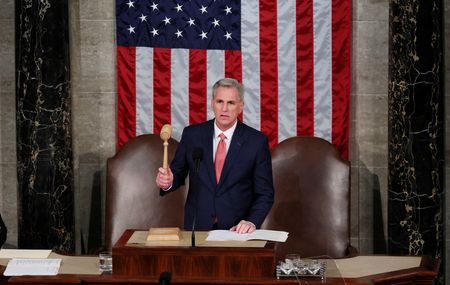By Richard Cowan and Katharine Jackson
WASHINGTON (Reuters) -U.S. House of Representatives Speaker Kevin McCarthy on Monday outlined spending cuts he said his fellow Republicans would demand in exchange for voting to raise the federal government’s $31.4 trillion debt ceiling, avoiding a potentially catastrophic default.
His proposals included cutting spending to last year’s levels, capping growth at 1% per year and reversing some of President Joe Biden’s policy goals, ideas that Republicans, who control the House, have been floating for weeks that have been rejected by Democrats, who control the Senate and White House.
McCarthy sketched out his ideas in a speech to the New York Stock Exchange as the government ticks closer to the moment sometime this summer when it will no longer be able to meet its financial obligations. Inaction by the divided Congress ultimately would trigger a historic default that would shake the U.S. and world economies.
A 2011 standoff over the debt ceiling triggered the first credit downgrade of the U.S. government, and investors are already showing signs of worry about this one. A market-based gauge of the risk of a U.S. default is the highest since 2012, and has climbed sharply this year as the debt ceiling debate has intensified in Washington.
“Congressional Republicans are ready to act and to lead,” McCarthy said, adding that the House would vote “in the coming weeks” on a bill to cut spending and raise the debt ceiling to an unspecified date next year.
McCarthy said he will seek to toughen eligibility requirements for certain federal social safety net programs.
Democrats reacted with swift opposition to McCarthy’s framework.
“Today House Republicans have made their priorities crystal clear: keep Wall Street happy and take away health care and food assistance from working Americans,” said Senate Finance Committee Chairman Ron Wyden in a statement.
The Treasury Department has warned that the federal government could hit the “X-date,” when it is no longer to pay all its bills as early as June 5, while the nonpartisan Congressional Budget Office forecast that moment would come sometime between July and September.
LIMITED OPTIONS
The cuts McCarthy is proposing would not touch the main drivers of the debt Republicans complain about — the Social Security and Medicare retirement and healthcare programs that are projected to nearly double in cost over the next 10 years, according to the nonpartisan Congressional Budget Office.
Republicans have also said they don’t intend to cut military spending. McCarthy said on Monday that he would not agree to raising taxes
That leaves little ways to meaningfully reduce the budget deficit, the gap between the amount of money the government takes in and spends.
McCarthy leads a fractious caucus that holds a narrow 222-213 House majority, including a sizeable contingent of hard line members who want sharp spending cuts and dismiss the risks of failure to act on the debt ceiling. So far House Republicans have not produced a proposed budget of their own, a move that Biden contends would be a necessary starting point for negotiations on spending.
The White House last month proposed its own budget, which it said would cut the nation’s deficit by nearly $3 trillion over 10 years, though it relied on increases in taxes on businesses and the wealthy, rather than spending cuts, to do so.
The White House also notes that Congress raised the budget ceiling three times without conditions under Biden’s Republican predecessor, Donald Trump. Congress needs to raise the debt ceiling to cover the costs of previously passed legislation, including Trump’s 2017 tax cuts and trillions in aid approved during the COVID-19 pandemic.
“Speaker McCarthy is breaking with the bipartisan norm he followed under Trump by engaging in dangerous economic hostage taking that threatens hard-working Americans’ jobs and retirement savings,” White House spokesperson Andrew Bates said in a statement.
The CBO last month laid out a range of options to address the debt, which showed that higher tax collections would have significantly more impact than the spending cuts under consideration.
(Reporting by Richard Cowan and Katharine Jackson, additional reporting by Steve Holland; Editing by Scott Malone and Alistair Bell)
